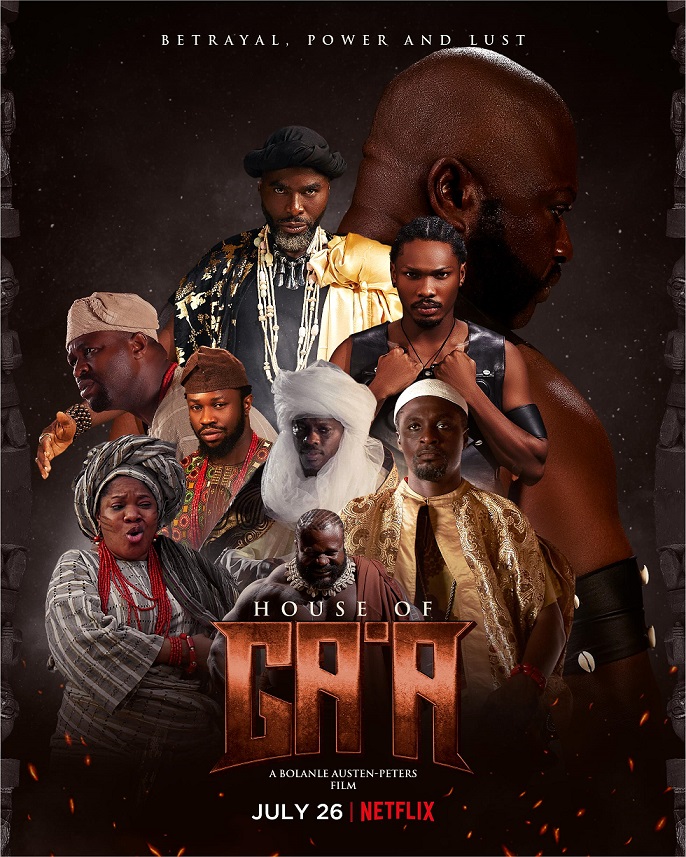House of Ga’a opens in the mid-17th century as Oyo warriors fell the Nupe army in a swift and brutal defeat. The clash feels sparse but this ambitious start must mean there’s more to come. Femi Branch leads Bolanle Austen Peters’ meaty drama about a tyrannical kingmaker with hard-edged gusto. Plus, it is premised on actual history. The plot crackles with intensity, a medley of action, politics, fraught relationships, and young love. In typical Yoruba epic fashion, it indulges melodrama and violence; the exciting fight sequences make up for the usual dull colour grade. As it continues, though, House of Ga’a pulls its punches. The promise of surprise is all petered out, and even Branch’s inimitable sneer cannot save this film from itself.
The real Bashorun Ga’a lived during the height of the sprawling Oyo Empire, a renowned military leader whose fall from grace has been spun into a popular Yoruba adage: If you are brave, venture into wickedness, but if you remember the death of Ga’a, adhere to the truth. Tunde Babalola’s script resists a cardboard absolute-power-corrupts tale, and instead attempts to flesh out historical accounts. This version’s success is more a result of brute force and juju magic than any particular cunning.
Ga’a revels in taking, even from his own sons. His covetous tendencies spiral into an inordinate lust for power after he is not only appointed to the Oyo Mesi, the kingmaker council, as a reward for his military feats, but also made its top official, the Bashorun, a Prime Minister-like figure. Soon, he engineers the death of the Alaafin and appoints a new one. In several scenes, he summons each new Alaafin to his home in the dead of night and demands the king prostrate before him. He serves arbitrary sentences at the slightest hint of opposition, until the very fabric of Oyo is at his mercy. His sons are equally fearsome, except the youngest, our narrator Oyemekun, who retches in the aftermath of a battle, and is one to show mercy in a fight.
Femi Branch delivers an excellent performance, working charisma that anchors the narrative. His Ga’a moves through the film with the makings of a truly complex villain, but we’re not quite sure where he’s going. His character’s motivations are unclear, save one tragic backstory clumsily fitted into a flashback.
There are other missed narrative beats, none so grating as Mike Afolarin’s Oyemekun, whose seeming evolution to hero turns stunted. He is yet to be as hardened as his father and brothers at the start of the film, but it becomes apparent about halfway through, when his character remains infuriatingly depthless, that there will be no satisfying payoff to this coming-of-age subplot, and the young Homecoming star flounders within the narrow range meted to him by Babalola’s script.
Tosin Adeyemi is Zeinab, a Nupe woman captured as a slave after her people are defeated in the opening battle. It is her first major performance in a feature film but Adeyemi does not shirk from Branch’s heavy presence. Ga’a takes Zeinab as a concubine but is perturbed when she impassively submits. “I will obey your command with my body but not with my heart,” she tells him, and he unwittingly takes her up on earning it, or at least that is what the film might have intended, until this compelling dynamic tapers into nothing in the end.
Jide Oyegbile is Ga’a’s ruthless warrior son Olaotan, William Benson plays juju man Gbagi with sinister glee, and at the lowest rung of the household is Ga’a’s drunken brother Olubu, assumed thoroughly by Adedimeji Lateef. The star-studded cast also has Funke Akindele, in the small supporting role of Ga’a’s first wife. Too small, one might argue, for an actress of her calibre. Toyin Abraham’s is more insignificant than anything, with miniscule screen-time and the identity of her character unclear for most of the film until the blink-and-you’ll-miss-it reference to Ga’a as her brother before she is promptly killed off. The presence of the two superstars does little more than not-so-subtly quash any remaining rumours of real-life rivalry.
The film’s highs are in its quality production, with meticulous costuming, set design, and well-done effects (except perhaps that awkward pair of VFX breasts), but House of Ga’a doubles down on Nollywood’s writing problem and ultimately topples to a rushed resolution. As the Yoruba epic solidifies into its own sub-genre — with the preceding successes of King of Thieves (Agesinkole) and Jagun Jagun on Netflix, both helmed by Femi Adebayo who is a consulting producer on House of Ga’a — it may be a while until we see a refreshing entry. Austen-Peters succeeds here in keeping audiences perched on the edge of their seats. In the meantime, that will have to do. ♦
If you love what you just read, please consider making a PayPal donation to enable us to publish more like it.
More Film & TV Reviews from Open Country Mag
— Afamefuna: An Nwa Boi Story, Reviewed: A Winning Depiction of the Igbo Apprenticeship System
— Breath of Life, Reviewed: Faith, Redemption, & Male Friendship
— Ebrohimie Road, Reviewed: A Literary Legend as Father & Husband
— A Tribe Called Judah, Reviewed: A Box Office-Breaking Heist of Authenticity & Heart
— Jagun Jagun, Reviewed: New Heights for the Nollywood Historical Epic
— The Real Housewives of Lagos, Recapped & Reviewed: Glamour & Drama in Las Gidi
— Battle on Buka Street, Reviewed: Blockbuster Dramedy with Emotional Burn
— The Trade, Reviewed: Kidnappers Vs. Police
— King of Thieves (Agesinkole), Reviewed: A Captivating Yoruba Epic
— Gangs of Lagos, Reviewed: A Crime Thriller with Big Ambition
— Brotherhood, Reviewed: A Policeman and a Robber
— Shanty Town, Reviewed: Crime and Punishment, Fate and Freedom
— A Sunday Affair, Reviewed: A Stumbling Story of Romance and Tested Friendship
— Prophetess, Reviewed: A Modernist Portrayal of Faith
— Blood Sisters, Reviewed: A Rousing Murder Thriller
— La Femme Anjola, Reviewed: An African Neo-Noir Titillates in Crime and Lust
— Swallow, Reviewed: Perturbance in Ordinary Lives
— Ife, Reviewed: Lesbian Love in Bourgie Lagos
— Nne, Reviewed: Two Mothers and a Son
— The Men’s Club, Reviewed: A Charming Depiction of Male Friendship


